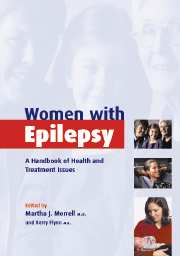Book contents
- Frontmatter
- Contents
- List of contributors
- Part I The woman with epilepsy
- Part II Epilepsy diagnosis and treatment
- Part III Hormones and the brain
- Part IV Health challenges for women with epilepsy
- 14 Reproductive health for women with epilepsy
- 15 Sexual dysfunction in epilepsy
- 16 Bone health in women with epilepsy
- 17 Psychiatric complications in epilepsy
- Part V Family planning, pregnancy, and parenting
- Part VI Living well with epilepsy
- Appendix: The Epilepsy Foundation's Campaign for Women's Health: bringing help and hope to women with epilepsy
- Index
- References
14 - Reproductive health for women with epilepsy
from Part IV - Health challenges for women with epilepsy
Published online by Cambridge University Press: 02 November 2009
- Frontmatter
- Contents
- List of contributors
- Part I The woman with epilepsy
- Part II Epilepsy diagnosis and treatment
- Part III Hormones and the brain
- Part IV Health challenges for women with epilepsy
- 14 Reproductive health for women with epilepsy
- 15 Sexual dysfunction in epilepsy
- 16 Bone health in women with epilepsy
- 17 Psychiatric complications in epilepsy
- Part V Family planning, pregnancy, and parenting
- Part VI Living well with epilepsy
- Appendix: The Epilepsy Foundation's Campaign for Women's Health: bringing help and hope to women with epilepsy
- Index
- References
Summary
Women with epilepsy are less likely to have children than women without epilepsy. For many years, it was assumed this was because women with epilepsy were less likely to be married and, when married, more likely to choose to remain childless. Women with epilepsy now have marriage rates equivalent to women without epilepsy. Better prenatal care and information about the excellent outcome for more than 90% of pregnancies in women with epilepsy suggest that more women are able to choose to be mothers. However, birth rates remain lower than expected. In part, this can be explained by recent findings that women with epilepsy are less likely to ovulate and more likely to have disorders of reproductive hormones. Whether these reproductive health disturbances are caused by seizures, by antiepileptic medications, or by both, is now being debated in the medical community. This chapter discusses some of the reproductive disturbances in women with epilepsy and points out signs and symptoms that women should report to their health-care providers.
MJMIntroduction
Having epilepsy often means more than having seizures. Other areas of health may also be negatively impacted in the person with epilepsy, including reproductive health. Medical research suggests that women with epilepsy are more likely to have irregular menstrual cycles, menstrual cycles during which ovulation does not occur, and disturbances in the hormones that regulate the menstrual cycle and are needed for normal fertility.
Keywords
- Type
- Chapter
- Information
- Women with EpilepsyA Handbook of Health and Treatment Issues, pp. 145 - 151Publisher: Cambridge University PressPrint publication year: 2003
References
- 1
- Cited by

